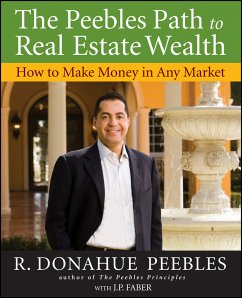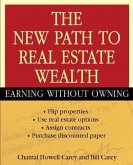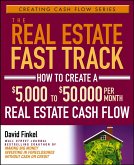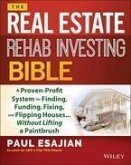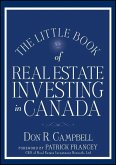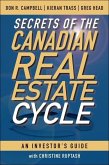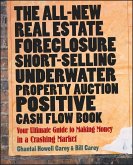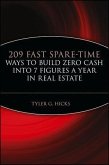R. Donahue Peebles
The Peebles Path to Real Estate Wealth (eBook, PDF)
How to Make Money in Any Market
17,99 €
17,99 €
inkl. MwSt.
Sofort per Download lieferbar

0 °P sammeln
17,99 €
Als Download kaufen

17,99 €
inkl. MwSt.
Sofort per Download lieferbar

0 °P sammeln
Jetzt verschenken
Alle Infos zum eBook verschenken
17,99 €
inkl. MwSt.
Sofort per Download lieferbar
Alle Infos zum eBook verschenken

0 °P sammeln
R. Donahue Peebles
The Peebles Path to Real Estate Wealth (eBook, PDF)
How to Make Money in Any Market
- Format: PDF
- Merkliste
- Auf die Merkliste
- Bewerten Bewerten
- Teilen
- Produkt teilen
- Produkterinnerung
- Produkterinnerung

Bitte loggen Sie sich zunächst in Ihr Kundenkonto ein oder registrieren Sie sich bei
bücher.de, um das eBook-Abo tolino select nutzen zu können.
Hier können Sie sich einloggen
Hier können Sie sich einloggen
Sie sind bereits eingeloggt. Klicken Sie auf 2. tolino select Abo, um fortzufahren.

Bitte loggen Sie sich zunächst in Ihr Kundenkonto ein oder registrieren Sie sich bei bücher.de, um das eBook-Abo tolino select nutzen zu können.
You can still find plenty of good deals in a failing real estate market by applying the advice in The Peebles Path to Real Estate Wealth: How to Make Money in Any Market. Multimillionaire teal estate mogul R. Donahue Peebles makes it possible for you to always win in real estate, provided you have the right knowledge and exercise good judgment in the deals you make. Start with small investments and work up to bigger, more profitable properties; before you know it, you'll be a smart investor earning large profits!
- Geräte: PC
- mit Kopierschutz
- eBook Hilfe
- Größe: 0.88MB
Andere Kunden interessierten sich auch für
![The New Path to Real Estate Wealth (eBook, PDF) The New Path to Real Estate Wealth (eBook, PDF)]() Chantal Howell CareyThe New Path to Real Estate Wealth (eBook, PDF)13,99 €
Chantal Howell CareyThe New Path to Real Estate Wealth (eBook, PDF)13,99 €![The Real Estate Fast Track (eBook, PDF) The Real Estate Fast Track (eBook, PDF)]() David FinkelThe Real Estate Fast Track (eBook, PDF)13,99 €
David FinkelThe Real Estate Fast Track (eBook, PDF)13,99 €![The Real Estate Rehab Investing Bible (eBook, PDF) The Real Estate Rehab Investing Bible (eBook, PDF)]() Paul EsajianThe Real Estate Rehab Investing Bible (eBook, PDF)16,99 €
Paul EsajianThe Real Estate Rehab Investing Bible (eBook, PDF)16,99 €![The Little Book of Real Estate Investing in Canada (eBook, PDF) The Little Book of Real Estate Investing in Canada (eBook, PDF)]() Don R. CampbellThe Little Book of Real Estate Investing in Canada (eBook, PDF)11,99 €
Don R. CampbellThe Little Book of Real Estate Investing in Canada (eBook, PDF)11,99 €![Secrets of the Canadian Real Estate Cycle (eBook, PDF) Secrets of the Canadian Real Estate Cycle (eBook, PDF)]() Don R. CampbellSecrets of the Canadian Real Estate Cycle (eBook, PDF)20,99 €
Don R. CampbellSecrets of the Canadian Real Estate Cycle (eBook, PDF)20,99 €![The All-New Real Estate Foreclosure, Short-Selling, Underwater, Property Auction, Positive Cash Flow Book (eBook, PDF) The All-New Real Estate Foreclosure, Short-Selling, Underwater, Property Auction, Positive Cash Flow Book (eBook, PDF)]() Chantal Howell CareyThe All-New Real Estate Foreclosure, Short-Selling, Underwater, Property Auction, Positive Cash Flow Book (eBook, PDF)14,99 €
Chantal Howell CareyThe All-New Real Estate Foreclosure, Short-Selling, Underwater, Property Auction, Positive Cash Flow Book (eBook, PDF)14,99 €![209 Fast Spare-Time Ways to Build Zero Cash into 7 Figures a Year in Real Estate (eBook, PDF) 209 Fast Spare-Time Ways to Build Zero Cash into 7 Figures a Year in Real Estate (eBook, PDF)]() Tyler G. Hicks209 Fast Spare-Time Ways to Build Zero Cash into 7 Figures a Year in Real Estate (eBook, PDF)14,99 €
Tyler G. Hicks209 Fast Spare-Time Ways to Build Zero Cash into 7 Figures a Year in Real Estate (eBook, PDF)14,99 €-
-
-
You can still find plenty of good deals in a failing real estate market by applying the advice in The Peebles Path to Real Estate Wealth: How to Make Money in Any Market. Multimillionaire teal estate mogul R. Donahue Peebles makes it possible for you to always win in real estate, provided you have the right knowledge and exercise good judgment in the deals you make. Start with small investments and work up to bigger, more profitable properties; before you know it, you'll be a smart investor earning large profits!
Dieser Download kann aus rechtlichen Gründen nur mit Rechnungsadresse in A, B, BG, CY, CZ, D, DK, EW, E, FIN, F, GR, HR, H, IRL, I, LT, L, LR, M, NL, PL, P, R, S, SLO, SK ausgeliefert werden.
Produktdetails
- Produktdetails
- Verlag: John Wiley & Sons
- Seitenzahl: 224
- Erscheinungstermin: 24. Juli 2008
- Englisch
- ISBN-13: 9780470392669
- Artikelnr.: 38203639
- Verlag: John Wiley & Sons
- Seitenzahl: 224
- Erscheinungstermin: 24. Juli 2008
- Englisch
- ISBN-13: 9780470392669
- Artikelnr.: 38203639
- Herstellerkennzeichnung Die Herstellerinformationen sind derzeit nicht verfügbar.
R. Donahue Peebles is Chairman and CEO of The Peebles Corporation, one of the nation's most successful real estate investment firms. A leading developer and entrepreneur, his portfolio includes four-star hotels and residential and commercial properties in Las Vegas, San Francisco, Washington, D.C., and Miami Beach. He is also the author of The Peebles Principles, from Wiley.
Introduction: The Opportunity of Setbacks (Why I Wrote This Book) ix
Part One A Recent History of the Real Estate Roller Coaster 1
Chapter 1 The Big Bang: The Post-2000 Real Estate Explosion 3
Between 2000 and 2006, mortgage interest rates in the United States fell in
half. That started a feeding frenzy, which sent housing prices to dizzying
heights.
Chapter 2 The Great Flood: The Oversupply of Housing 17
Combined with the growing thirst for inventory, spiraling prices encouraged
developers to build more projects. And guess what? Blind to the downturn,
they built way too much.
Chapter 3 Down Time: The New Buyer's Market 33
Because of the credit crunch and the oversupply, we are now on the down
slope of the housing bubble, with prices dropping across the country. That
means opportunities are everywhere.
Part Two Fundamental Tools for Real Estate Investing 45
Chapter 4 Information Please: Where to Find The Data 47
The good news about real estate investing is that anyone can do it. Having
said that, you need to do your homework to make a superior investment.
Chapter 5 Adding It Up: A Crash Course in Valuation 57
Figuring out the value of a piece of property-what it's really worth-is
both an analytic and creative process. It is also fundamental to making a
good investment.
Chapter 6 The Big Guns: Finding Help from the Government 71
If you want to buy property, or protect property that is now threatened by
skyrocketing mortgage payments, don't discount the power of government
programs.
Chapter 7 Money Talks: Negotiating with the Lender 81
The average person who goes to a bank for a mortgage figures it's not
negotiable. Wrong. Here are a few helpful insights to help you negotiate
with the man behind the curtain.
Part Three CREATING WEALTH IN THE NEW LANDSCAPE 89
Chapter 8 Boom to Bust: Making Money in Down Times 91
To understand the current situation you have to look back at historic real
estate cycles, in particular to the real estate crisis of the early 1990s.
Chapter 9 Fundamental Values: Buying in the Right Regions, Cities, and
Neighborhoods 107
A big aspect of the current real estate crisis is that it's indiscriminant.
It's hurting every market in the country, even places with solid
fundamentals. And that's where to buy.
Chapter 10 Specific Observations: Making the Deals 119
Once you understand current values-where to buy and when to buy-you still
have to make that perfect deal. So size up your seller.
Chapter 11 Techniques, Tactics, and Tricks: Useful Tools to Make Money 133
Understanding real estate principles is vital, but it also helps to know a
few things about auctions, foreclosures, bank-owned properties, and
contracts for preconstruction sales. In other words, how can you best
leverage cash and credit, or just one of the two?
Chapter 12 Outside the Residential Box: Investing in Commercial Real Estate
157
The opportunities in real estate go beyond the residential marketplace;
should you consider investing in commercial properties?
Part Four Saving Your Bacon 173
(How to Avoid Getting Swept Under by the Subprime Tide)
Chapter 13 Be Like the Rich: Change Your Way of Thinking 175
In America we have been conditioned to follow the rules. But what happens
when the rules change and the system does not protect you?
Chapter 14 Showtime: Dealing with Your Lender 185
The first lesson in learning how to think (and act) differently is how to
renegotiate. Even if you have a bad mortgage on a property you own, you
have more leverage than you think, even in foreclosure.
Chapter 15 Know When to Fold: The Time to Walk Away, and How to Do It 197
Sometimes it no longer makes sense to fight for a property. Then you need
to know how to get out with the least possible damage.
Index 202
Part One A Recent History of the Real Estate Roller Coaster 1
Chapter 1 The Big Bang: The Post-2000 Real Estate Explosion 3
Between 2000 and 2006, mortgage interest rates in the United States fell in
half. That started a feeding frenzy, which sent housing prices to dizzying
heights.
Chapter 2 The Great Flood: The Oversupply of Housing 17
Combined with the growing thirst for inventory, spiraling prices encouraged
developers to build more projects. And guess what? Blind to the downturn,
they built way too much.
Chapter 3 Down Time: The New Buyer's Market 33
Because of the credit crunch and the oversupply, we are now on the down
slope of the housing bubble, with prices dropping across the country. That
means opportunities are everywhere.
Part Two Fundamental Tools for Real Estate Investing 45
Chapter 4 Information Please: Where to Find The Data 47
The good news about real estate investing is that anyone can do it. Having
said that, you need to do your homework to make a superior investment.
Chapter 5 Adding It Up: A Crash Course in Valuation 57
Figuring out the value of a piece of property-what it's really worth-is
both an analytic and creative process. It is also fundamental to making a
good investment.
Chapter 6 The Big Guns: Finding Help from the Government 71
If you want to buy property, or protect property that is now threatened by
skyrocketing mortgage payments, don't discount the power of government
programs.
Chapter 7 Money Talks: Negotiating with the Lender 81
The average person who goes to a bank for a mortgage figures it's not
negotiable. Wrong. Here are a few helpful insights to help you negotiate
with the man behind the curtain.
Part Three CREATING WEALTH IN THE NEW LANDSCAPE 89
Chapter 8 Boom to Bust: Making Money in Down Times 91
To understand the current situation you have to look back at historic real
estate cycles, in particular to the real estate crisis of the early 1990s.
Chapter 9 Fundamental Values: Buying in the Right Regions, Cities, and
Neighborhoods 107
A big aspect of the current real estate crisis is that it's indiscriminant.
It's hurting every market in the country, even places with solid
fundamentals. And that's where to buy.
Chapter 10 Specific Observations: Making the Deals 119
Once you understand current values-where to buy and when to buy-you still
have to make that perfect deal. So size up your seller.
Chapter 11 Techniques, Tactics, and Tricks: Useful Tools to Make Money 133
Understanding real estate principles is vital, but it also helps to know a
few things about auctions, foreclosures, bank-owned properties, and
contracts for preconstruction sales. In other words, how can you best
leverage cash and credit, or just one of the two?
Chapter 12 Outside the Residential Box: Investing in Commercial Real Estate
157
The opportunities in real estate go beyond the residential marketplace;
should you consider investing in commercial properties?
Part Four Saving Your Bacon 173
(How to Avoid Getting Swept Under by the Subprime Tide)
Chapter 13 Be Like the Rich: Change Your Way of Thinking 175
In America we have been conditioned to follow the rules. But what happens
when the rules change and the system does not protect you?
Chapter 14 Showtime: Dealing with Your Lender 185
The first lesson in learning how to think (and act) differently is how to
renegotiate. Even if you have a bad mortgage on a property you own, you
have more leverage than you think, even in foreclosure.
Chapter 15 Know When to Fold: The Time to Walk Away, and How to Do It 197
Sometimes it no longer makes sense to fight for a property. Then you need
to know how to get out with the least possible damage.
Index 202
Introduction: The Opportunity of Setbacks (Why I Wrote This Book) ix
Part One A Recent History of the Real Estate Roller Coaster 1
Chapter 1 The Big Bang: The Post-2000 Real Estate Explosion 3
Between 2000 and 2006, mortgage interest rates in the United States fell in
half. That started a feeding frenzy, which sent housing prices to dizzying
heights.
Chapter 2 The Great Flood: The Oversupply of Housing 17
Combined with the growing thirst for inventory, spiraling prices encouraged
developers to build more projects. And guess what? Blind to the downturn,
they built way too much.
Chapter 3 Down Time: The New Buyer's Market 33
Because of the credit crunch and the oversupply, we are now on the down
slope of the housing bubble, with prices dropping across the country. That
means opportunities are everywhere.
Part Two Fundamental Tools for Real Estate Investing 45
Chapter 4 Information Please: Where to Find The Data 47
The good news about real estate investing is that anyone can do it. Having
said that, you need to do your homework to make a superior investment.
Chapter 5 Adding It Up: A Crash Course in Valuation 57
Figuring out the value of a piece of property-what it's really worth-is
both an analytic and creative process. It is also fundamental to making a
good investment.
Chapter 6 The Big Guns: Finding Help from the Government 71
If you want to buy property, or protect property that is now threatened by
skyrocketing mortgage payments, don't discount the power of government
programs.
Chapter 7 Money Talks: Negotiating with the Lender 81
The average person who goes to a bank for a mortgage figures it's not
negotiable. Wrong. Here are a few helpful insights to help you negotiate
with the man behind the curtain.
Part Three CREATING WEALTH IN THE NEW LANDSCAPE 89
Chapter 8 Boom to Bust: Making Money in Down Times 91
To understand the current situation you have to look back at historic real
estate cycles, in particular to the real estate crisis of the early 1990s.
Chapter 9 Fundamental Values: Buying in the Right Regions, Cities, and
Neighborhoods 107
A big aspect of the current real estate crisis is that it's indiscriminant.
It's hurting every market in the country, even places with solid
fundamentals. And that's where to buy.
Chapter 10 Specific Observations: Making the Deals 119
Once you understand current values-where to buy and when to buy-you still
have to make that perfect deal. So size up your seller.
Chapter 11 Techniques, Tactics, and Tricks: Useful Tools to Make Money 133
Understanding real estate principles is vital, but it also helps to know a
few things about auctions, foreclosures, bank-owned properties, and
contracts for preconstruction sales. In other words, how can you best
leverage cash and credit, or just one of the two?
Chapter 12 Outside the Residential Box: Investing in Commercial Real Estate
157
The opportunities in real estate go beyond the residential marketplace;
should you consider investing in commercial properties?
Part Four Saving Your Bacon 173
(How to Avoid Getting Swept Under by the Subprime Tide)
Chapter 13 Be Like the Rich: Change Your Way of Thinking 175
In America we have been conditioned to follow the rules. But what happens
when the rules change and the system does not protect you?
Chapter 14 Showtime: Dealing with Your Lender 185
The first lesson in learning how to think (and act) differently is how to
renegotiate. Even if you have a bad mortgage on a property you own, you
have more leverage than you think, even in foreclosure.
Chapter 15 Know When to Fold: The Time to Walk Away, and How to Do It 197
Sometimes it no longer makes sense to fight for a property. Then you need
to know how to get out with the least possible damage.
Index 202
Part One A Recent History of the Real Estate Roller Coaster 1
Chapter 1 The Big Bang: The Post-2000 Real Estate Explosion 3
Between 2000 and 2006, mortgage interest rates in the United States fell in
half. That started a feeding frenzy, which sent housing prices to dizzying
heights.
Chapter 2 The Great Flood: The Oversupply of Housing 17
Combined with the growing thirst for inventory, spiraling prices encouraged
developers to build more projects. And guess what? Blind to the downturn,
they built way too much.
Chapter 3 Down Time: The New Buyer's Market 33
Because of the credit crunch and the oversupply, we are now on the down
slope of the housing bubble, with prices dropping across the country. That
means opportunities are everywhere.
Part Two Fundamental Tools for Real Estate Investing 45
Chapter 4 Information Please: Where to Find The Data 47
The good news about real estate investing is that anyone can do it. Having
said that, you need to do your homework to make a superior investment.
Chapter 5 Adding It Up: A Crash Course in Valuation 57
Figuring out the value of a piece of property-what it's really worth-is
both an analytic and creative process. It is also fundamental to making a
good investment.
Chapter 6 The Big Guns: Finding Help from the Government 71
If you want to buy property, or protect property that is now threatened by
skyrocketing mortgage payments, don't discount the power of government
programs.
Chapter 7 Money Talks: Negotiating with the Lender 81
The average person who goes to a bank for a mortgage figures it's not
negotiable. Wrong. Here are a few helpful insights to help you negotiate
with the man behind the curtain.
Part Three CREATING WEALTH IN THE NEW LANDSCAPE 89
Chapter 8 Boom to Bust: Making Money in Down Times 91
To understand the current situation you have to look back at historic real
estate cycles, in particular to the real estate crisis of the early 1990s.
Chapter 9 Fundamental Values: Buying in the Right Regions, Cities, and
Neighborhoods 107
A big aspect of the current real estate crisis is that it's indiscriminant.
It's hurting every market in the country, even places with solid
fundamentals. And that's where to buy.
Chapter 10 Specific Observations: Making the Deals 119
Once you understand current values-where to buy and when to buy-you still
have to make that perfect deal. So size up your seller.
Chapter 11 Techniques, Tactics, and Tricks: Useful Tools to Make Money 133
Understanding real estate principles is vital, but it also helps to know a
few things about auctions, foreclosures, bank-owned properties, and
contracts for preconstruction sales. In other words, how can you best
leverage cash and credit, or just one of the two?
Chapter 12 Outside the Residential Box: Investing in Commercial Real Estate
157
The opportunities in real estate go beyond the residential marketplace;
should you consider investing in commercial properties?
Part Four Saving Your Bacon 173
(How to Avoid Getting Swept Under by the Subprime Tide)
Chapter 13 Be Like the Rich: Change Your Way of Thinking 175
In America we have been conditioned to follow the rules. But what happens
when the rules change and the system does not protect you?
Chapter 14 Showtime: Dealing with Your Lender 185
The first lesson in learning how to think (and act) differently is how to
renegotiate. Even if you have a bad mortgage on a property you own, you
have more leverage than you think, even in foreclosure.
Chapter 15 Know When to Fold: The Time to Walk Away, and How to Do It 197
Sometimes it no longer makes sense to fight for a property. Then you need
to know how to get out with the least possible damage.
Index 202
